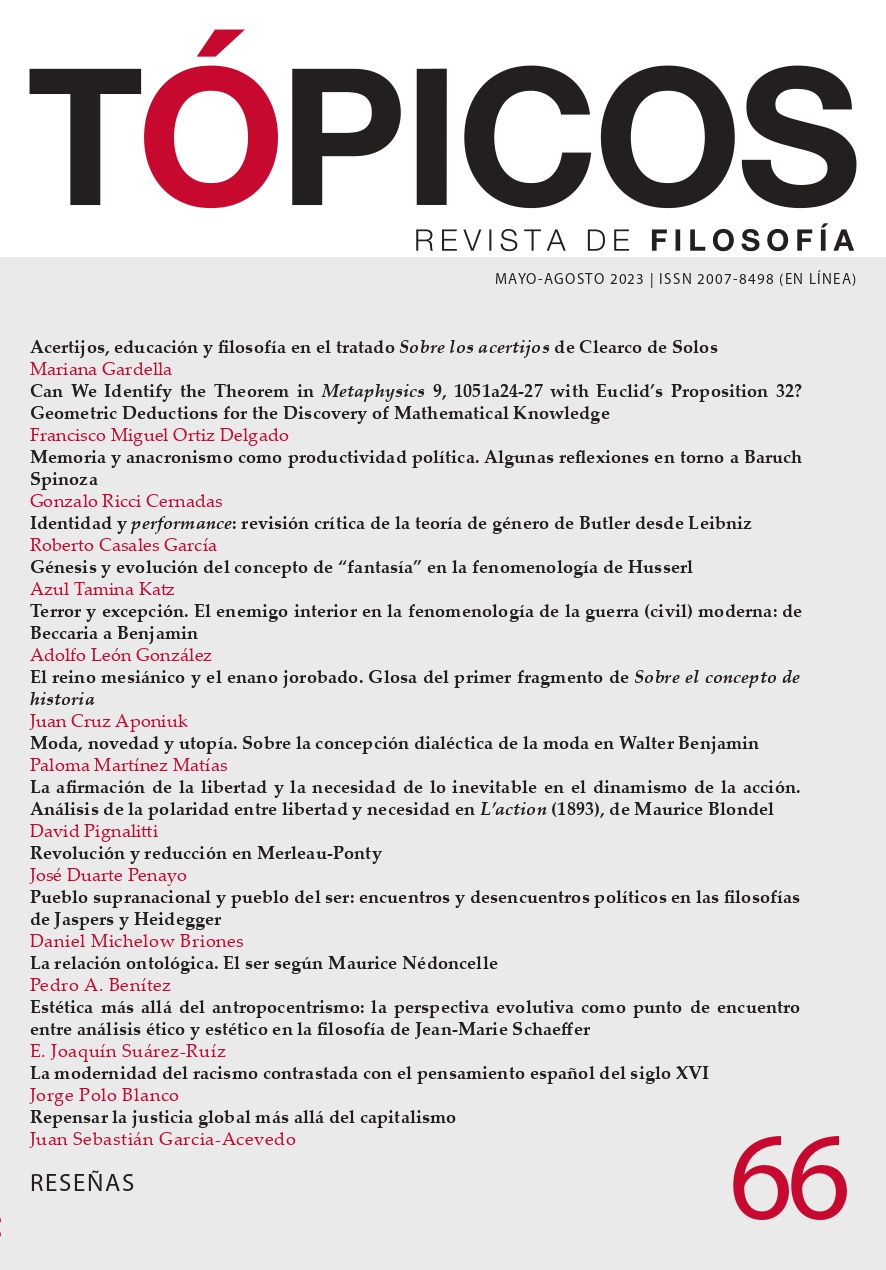Published 2023-04-11
How to Cite
Copyright (c) 2023 Tópicos, Revista de Filosofía

This work is licensed under a Creative Commons Attribution-NonCommercial-NoDerivatives 4.0 International License.
Downloads
Altmetrics
Citas
Abstract
This paper proposes a recentralization of Merleau-Ponty’s political thought in order to give account, not only of a local aspect of his philosophy, but rather of a privileged interpretative key to understand the author’s work as a whole. In this sense, we will argue in favor of the existence of an intimate relationship between phenomenological reduction and the internal logic of revolutionary processes. According to our reading, this relationship leads to the author’s critical thinking of history and being- in-the-world.
References
- Audier, S. (2005). Machiavel, conflit, liberté. Vrin.
- Audier, S. (2013). Le tournant de l’expérience. Recherches sur la philosophie de Merleau-Ponty. Vrin.
- Eiff, L. D. (2014). Merleau-Ponty, filósofo de lo político. Universidad Nacional de General Sarmiento.
- Hegel, G. W. (1999). Principios de la filosofía del derecho. J. L. Vermal (trad.). Edhasa.
- Husserl, E. (1996). Meditaciones cartesianas. J. Gaos y M. García Baró (trad.). Fondo de Cultura Económica.
- Lefort, C. (1978) Sur une colonne absente. Gallimard.
- Lefort, C. (2001). Essais sur le politique. Gallimard.
- López Sáenz, M. C. (2010). Fenomenología y marxismo. El compromiso político de Merleau-Ponty. Daimon Revista Internacional de Filosofia, 51, 103-121. URL: https://revistas.um.es/daimon/article/view/148541.
- Mansilla, K. I. (2019). Expresión y contingencia en el pensamiento político de Maurice Merleau-Ponty. [Tesis doctoral]. Pontificia Universidad Católica del Perú. URL: http://tesis.pucp.edu.pe/repositorio/handle/20.500.12404/14256.
- Marchart, O. (2009). El pensamiento político posfundacional. La diferencia política en Nancy, Lefort, Badiou y Laclau. M. D. Álvarez (trad.). Fondo de Cultura Económica.
- Marmasse, G. (2018). Hegel y los desafíos de la historia. Iconoclasia. Investigaciones sobre y desde Marx, 1, 281-303.
- Melançon, J (2018). La politique dans l’adversité. Merleau-Ponty aux marges de la philosophie. Metis.
- Merleau-Ponty, M. (s. f.). Notes du travail de 1958-1960. Volume VIII.2. [Documento inédito]. Bibliothèque Nationale de France.
- Merleau-Ponty, M. (1964). Signos. C. Martínez y G. Oliver (trad.). Seix Barral.
- Merleau-Ponty, M. (1965). Humanismo y terror. L. Rozitcher (trad.). La pléyade.
- Merleau-Ponty, M. (1974). Las aventuras de la dialéctica. L. Rozitchner (trad.). La pléyade.
- Merleau-Ponty, M. (1993). Fenomenología de la percepción. J. Cabanes (trad.). Planeta.
- Merleau-Ponty, M. (2010). Lo visible y lo invisible. E. Consigli y B. Capdevielle (trad.). Nueva Visión.
- Merleau-Ponty, M. (2012). La institución. La pasividad. Notas de cursos en el Collège de France (1954-1955). M. Larison (trad.). Siglo XXI.
- Merleau-Ponty, M. (2016). Entretiens avec Georges Charbonnier et autres dialogues, 1946-1959. Verdier.
- Peillon, V. (2011). Éloge du politique. Une introduction au XXIe siècle. Seuil.
- Plot, M. (2008). La carne de lo social. Prometeo.
- Kojève, A. (2013). Introducción a la lectura de Hegel. A. Alonso Martos (trad.). Trotta.
- Kruks, S. (1994). The Political Philosophy of Merleau-Ponty. Gregg Revivals.
- Revault d’Allones, M. (2001). La chair du politique. Éditions Michalon.
- Robert, F. (2005). Phénoménologie et ontologie. Merleau-Ponty lecteur de Husserl et Heidegger. L’Harmattan.
- Revel, J. (2015). Foucault avec Merleau-Ponty. Ontologie politique, présentisme et histoire. Vrin.
- Whiteside, K. H. (1988). Merleau-Ponty and the Foundation of an Existential Politics. Princeton University Press.





